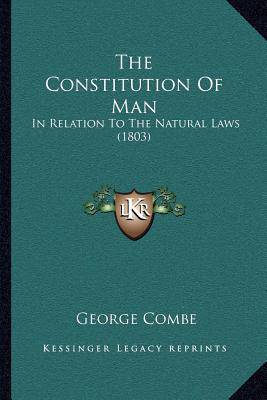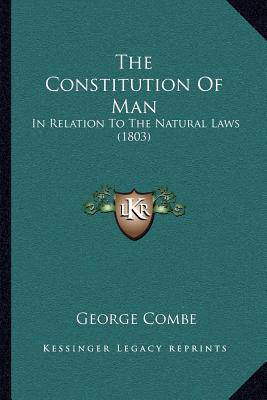
- Retrait gratuit dans votre magasin Club
- 7.000.000 titres dans notre catalogue
- Payer en toute sécurité
- Toujours un magasin près de chez vous
- Retrait gratuit dans votre magasin Club
- 7.000.0000 titres dans notre catalogue
- Payer en toute sécurité
- Toujours un magasin près de chez vous
40,95 €
+ 81 points
Format
Description
The Constitution of Man: In Relation to the Natural Laws, written by George Combe and published in 1803, is a treatise on the relationship between human nature and the natural laws that govern the universe. Combe argues that the laws of nature apply not only to the physical world but also to human behavior and society.The book is divided into four parts. In the first part, Combe discusses the principles of natural law and their application to human nature. He argues that humans are subject to the same laws of cause and effect as the rest of the natural world, and that understanding these laws is essential to understanding human behavior.In the second part, Combe examines the physical and mental constitution of humans. He discusses the various organs and functions of the body and brain, and how they relate to human behavior and personality.The third part of the book explores the role of education and environment in shaping human behavior. Combe argues that the environment plays a crucial role in determining individual character and that education should be tailored to the unique needs of each individual.In the final part of the book, Combe discusses the implications of his theories for society and government. He argues that a society based on the principles of natural law would be more just and equitable than one that ignores these laws.Overall, The Constitution of Man is an influential work in the field of natural philosophy and a key text in the development of phrenology, a pseudoscientific theory that claimed to be able to determine personality traits based on the shape of the skull. Despite its flaws, the book remains an important historical document and a fascinating exploration of the relationship between human nature and the natural world.This scarce antiquarian book is a facsimile reprint of the old original and may contain some imperfections such as library marks and notations. Because we believe this work is culturally important, we have made it available as part of our commitment for protecting, preserving, and promoting the world's literature in affordable, high quality, modern editions, that are true to their original work.
Spécifications
Parties prenantes
- Auteur(s) :
- Editeur:
Contenu
- Nombre de pages :
- 274
- Langue:
- Anglais
Caractéristiques
- EAN:
- 9781166987084
- Date de parution :
- 10-09-10
- Format:
- Livre broché
- Format numérique:
- Trade paperback (VS)
- Dimensions :
- 152 mm x 229 mm
- Poids :
- 367 g

Les avis
Nous publions uniquement les avis qui respectent les conditions requises. Consultez nos conditions pour les avis.






